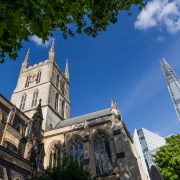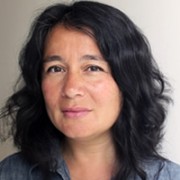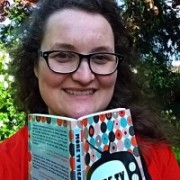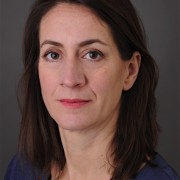Posts
Not sure you’ve got what it takes to win a Sandford St Martin Award in 2017? Read this…
/0 Comments/in General /by Anna McNamee
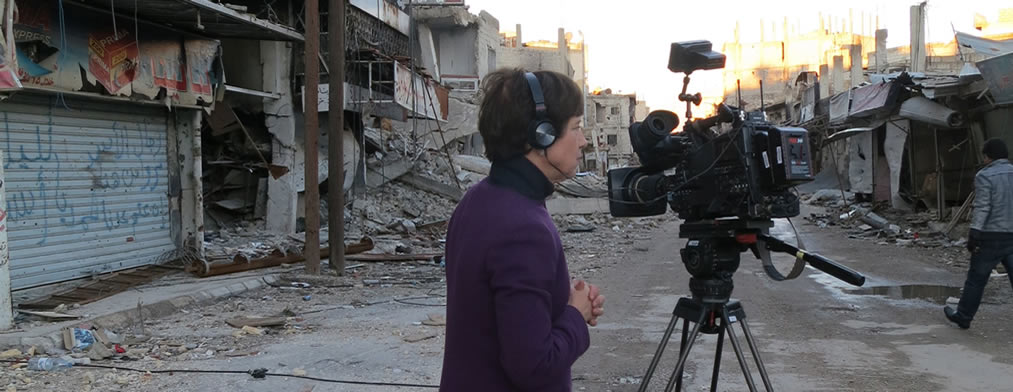
I’ll never forget the first ever conversation I had with the nervous man who would end up editing a series of documentaries about religion I was making.
“Nice to meet you”, he said before apologising, “I’m afraid I’m not very religious.”
“Not religious” I replied, “or not interested in religion.”
Because, while I can understand why people might make a connection, they’re not exactly the same thing are they?
And yet, years later, I still find myself having versions of the same conversation with colleagues. Which surprises me because how can a journalist, documentary or factual programme-maker NOT be interested in religion? What a person believes – or doesn’t believe – so often directly informs the decisions they make, the places they live, the people they know, who they vote for, what they’re willing to fight for, how they identify their sense of ‘self’ even, sometimes, the football team they support.
Open any newspaper and whether it’s a story about how evangelical churches and the right-to-life movement helped secure the presidency for Trump, fears of how anti-Semitism has infected UK party-politics, a story about why ISIS have been targeting Yazidis or why so many North Nigerian schoolgirls remain in captivity, religion matters. And these stories cannot be properly told or understood unless the people who are reporting on them properly consider religion.
And if you need any further proof that religion is interesting, just have a look at the programmes that were shortlisted and what went on to win last year’s Sandford Awards.
There were programmes about the big stories like the war in Syria or the European refugee crisis, but smaller, more personal stories, too, about coming out or the death of a loved one. What all these programme had in common was that none of them shied away from the fundamental journalistic questions: Who are we? How do we identify our place in the world? What do I believe or choose not to believe? And how has this informed the life I live? Questions bound up with religion, ethics, morality, spirituality, call it what you will – they’re all interesting.
Fortunately for me (not to mention the broadcaster we were working for), it turned out that nervous editor was, in fact, very interested in religion. And, if I dare say so myself, we made some good, thought-provoking, timely programmes together.
So… What about you?
Have you made a great programme that explores some of those fundamental questions? If the answer is ‘yes’, then you should probably enter for an Award.
And: are you interested in religion?
If so, then you’ve probably got what it takes to win one.
What I learnt watching telly for @sandfordawards
/0 Comments/in General /by Bryony TaylorFor 2016 the Sandford St Martin Awards have benefitted from the expertise and enthusiasm of a particularly distinguished group of judges and short-listers. Bryony Taylor, the author of ‘More TV Vicar‘ (a book that gets under the dog-collar of some of the best known religious characters on television) and a curate in Durham is one of them. Such is her dedication to duty that she not only cheerfully watched each and every TV programme entered for an award this year but she agreed, in the run up to the Awards ceremony on 8th June, to share with us (and you) some of her highlights. Our deepest thanks to her and her fellow adjudicators. This blog first appeared on her own website where you can find out more about Bryony and her work.
This year I was invited to help shortlist for the Sandford St Martin Awards – an awards scheme for excellence in broadcasting that engages with religion, ethics or spirituality. The shortlisting process involved watching a lot of television (obviously) that covered themes as wide ranging as Joan of Arc, Muslim Drag Queens and Srebrenica.
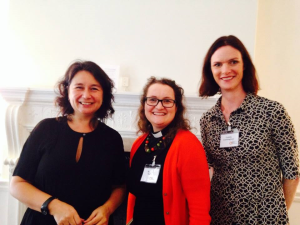
I think broadcasting that covers themes of religion, ethics and spirituality is only going to become more important in our current times. You have only to see some views espoused on social media or down the pub about religion and belief to realise how ill-informed most people are (and I include myself in that). Despite the decline of print media and even the decline in live television viewing – most of us still consume a lot of television – we simply do this via catch-up now or streaming services or saving up for a box set. Levels of religious literacy in particular are at an all time low, we don’t even understand our own religious background (which floats around like a ghost in the back of our mind with a refrain of ‘he who would valiant be’ from Primary School) – let alone understand what makes a Muslim tick. Most people wouldn’t get the ‘Blessed are the Cheesemakers’ joke from the Life of Brian any more – or at least wouldn’t be able to say where the joke comes from in the Bible. So we need good religious broadcasting. We need to understand the ‘other’ better in our world of angry tweets and incendiary Facebook posts.
Fascinatingly, a lot of the programmes I watched for the shortlisting were about extremism – either Islamic extremism or forms of fascism and white supremacy. Whilst I found these quite interesting, they didn’t teach me anything new, but perhaps even hardened my view on extremism.
The programmes I found most affecting were those in which we saw ordinary people trying to live out their faith. I particularly enjoyed the Irish documentary series ‘Baz the Lost Muslim‘ about a man who had grown up in Catholic Ireland with a Catholic mother but Egyptian Muslim father who decided to explore the faith of his father for the first time at the age of 40 – he had some profound moments along the way – particularly the first time he prayed.
Another wonderful programme was a short film about Muslim style vlogger Nabiilabee meeting with ex-Girls Aloud singer Nicola Roberts – they were sent on a mission to buy each other an outfit that worked with their own preferences – of course with modesty for the Muslim woman. This is a lovely programme which you can watch here – I particularly loved hearing Nabiilabee talking about ‘bad hijab days’! This was a really honest conversation about clothes and religious beliefs.
Another programme which showed the levels of diversity within a big religion like Islam was Muslim Drag Queens. Initially the provocative name put me off but this was a very moving documentary. The most striking part for me was when one more seasoned drag queen was teaching a new lad some moves in a night club (during the day). It came to prayer time and the younger lad was going to take his prayer mat into the corner to say his prayers. The older drag queen was horrified that his friend was happy to pray in such a place. It was fascinating – the discussion was not about their sexuality or the fact that they were drag queens but about their faith and how they live it out in Western Society. This was such a refreshing surprise – I’d love to see more programming like this. You can watch the programme on All 4 here – don’t let the title put you off!
My favourite programme which sadly wasn’t shortlisted ultimately (but got top marks from me!) was You, Me and the Apocalypse. This was a drama shown earlier in the year on Sky1. It is the most innovative drama I have seen in a long time. It benefits from having very high American drama production values and a very witty British script with a mixture of British and American actors. I think the reason it wasn’t shortlisted was that we shortlisted individual episodes, not whole series, and this is a series that really needs to be seen in its entirety and not one episode in isolation as the plot is complicated. The series is by turns hilarious, profound and moving and generates plenty of questions in the viewer. In my view it would be a great programme to watch over a few weeks as a small group from church or even as an adult confirmation course! The premise of the programme is that there is a meteor coming that will destroy the planet in 30 days and it tracks the response of a variety of characters in the UK and USA and other places whose stories begin to connect as the series progresses. I really recommend it and I was disappointed it didn’t ‘make the cut’ so to speak so I will sing its praises here!
I have only written here about a few of the programmes I watched. I thought it was a sad indictment of our times that so many were focused on the negative things to come out of religion or extremist beliefs. I hope that programme makers might look a bit more in the future at the more human stories of people working out what it means to live out their faith in the modern world as it is these stories we need to hear more. We all know what happens when religion goes wrong – we have the news for that – but drama and documentary makers have the opportunity to report on the real lives of believers and the complexities of being a person of faith – that is far more engaging and interesting!
If you want to know more about “More TV Vicar? Christians on Telly, the Good, the Bad and the Quirky” you can listen to an interview with Bryony here.
How To Judge a Sandford Award Winner
/0 Comments/in General, Uncategorized /by Penelope SolomonSandford St Martin Award shortlisters and judges are chosen for their wide experience of both religion and the media. They include experienced producers, programme-makers, directors, journalists and critics from a variety of faith backgrounds. In 2016 the comedian and Radio TV critic, Penelope Solomon, was one of the those who was given the daunting task of shortlisting our radio entries. Over the past few years, radio has been the Awards most competitive category. This year more than 90 radio programmes were in the running for prizes. In her blog, Penelope reveals more about the process and some of the highlights for her.
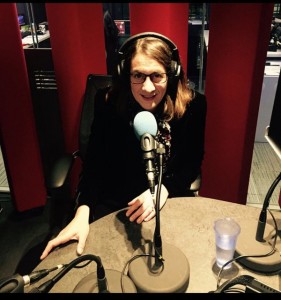
I WAS A SANFORD ST MARTIN AWARD SHORTLISTER
As a television critic, I like to select and compare programmes across different genres covering a range of topics. This helps to keep the viewing varied and interesting both for me and, hopefully, for my audience when I come to discuss the programmes live on air. For example I might watch a stand-up show like ‘Stewart Lee’s Comedy Vehicle’ and then contrast this with a documentary programme such as ‘Bedlam’ about mental illness in a psychiatric hospital in South London. (Some might argue that these two programmes are very closely linked, but that’s a subject for another blog!)
When I was invited to be on the shortlisting panel for the Sandford St Martin Awards, I was slightly daunted at first by the fact that I would be required to listen to a fair share of the almost eighty different radio programmes entered in the category and united by a common theme: religion, ethics and spirituality. Whilst I am interested in programmes which have a religious content, I thought the process might be a bit repetitive and dull. In truth, I didn’t really know what to expect. How delightfully surprised I was by the sheer range on offer from drama to documentary to live performances and church services. There was even a small selection of live Nativities!
Such was the diversity of voices, that contributions ranged from young Muslim women from Birmingham talking about wearing the hijab and fashion, to Jewish people ‘making Aliyah’ (i.e. emigrating to live in Israel) to an analysis of the Archbishop of Canterbury’s turbulent childhood. Questions around identity were a common theme in many programmes with different religious practices presented and issues affecting people from all walks of life, some who had faith and some with no faith. Some of the stories told were so gripping and evocative they brought tears to the eyes.
When a programme really works you can’t or indeed don’t want to stop listening. Strong resonant voices draw you into a carefully crafted story and somehow a connection is made which makes you want to keep on listening. During my listening I’d often find myself drawn in by programmes about topics I knew nothing about. When these stories were told well – through engaging contributors, a fresh approach and seamless editing – the result was extremely effective. I gained knowledge about different cultures and different ways of life and felt enriched and broadened by this new learning experience.
Music was a powerful and effective device used creatively in many of the programmes. Sometimes it was woven into the piece to break up or punctuate the narrative. At other times it was used to enhance meaning and emphasis within a story, to build up suspense and increase the tension. Stirring soundscapes were used to accompany chilling and harrowing stories. Occasionally music was over-used and became intrusive and distracted from the rest of the content, but this was rare. In some programmes the music and songs were so bold and stirring that I wanted to go out and buy the CD – if there had been one!) And then, there were other programmes which did not have any accompanying sound-track at all. It was interesting to note that some of these were equally as effective if not even more effective in engaging the listener. In these programmes it was the solitary voice and the spoken word which resonated and created an impact.
Several of the programmes explored current issues and contemporary themes such as same-sex marriages, religious fundamentalism, the radicalisation of young Muslims, freedom of speech or interfaith marriages and the fusion of eclectic family traditions. And the more I listened to these, the more I was surprised by how they stimulated my desire to discover more about other cultures, communities and religions and by how fascinating this learning was. I came away from the experience with a sense that I had touched upon some of the key issues that affect the lives of others and how important it is that this knowledge and information is shared.
In the end, my fellow shortlisters and I ended up with a long-list of fourteen excellent programmes which we then had to narrow down too a short-list of eight. We all had our favourites but after much analysis and discussion managed to agree in the end.
What strikes me on reflection is that there were hardly any comedy entries. Why is that? Is religion not funny? Are writers, producers or commissioners afraid to make jokes about Faith? Perhaps this is something for programme-makers and potential entrants to think about for next year.
You can read a full list of the programmes shortlisted for a 2016 Sandford St Martin Radio Award here.
Penelope is a Comedian and TV Critic for BBC Radio 4 (‘World Tonight’, ‘Today Programme’) and BBC Radio London.
As a performer credits include ‘Goodnight Sweetheart’ (BBC), ‘Fist of Fun’ (BBC), Sony Nominated ‘King of the Road’ (BBC Radio 2) and ‘Redeeming Brian’ by legendary sitcom writer David Nobbs (BBC Radio 2). She created and co-wrote ‘Tower of Bagel’ (Soho Theatre, Royal Festival Hall). Penelope has also performed live at: Theatre Royal Winchester, Royal Exchange Theatre, Manchester, Salisbury Playhouse, Bristol Old Vic and The Hackney Empire.
Penelope will preview her new live solo show at LEICESTER SQUARE THEATRE
on Saturday 16 July at 20.30
before heading to THE STAND COMEDY CLUB part of the EDINBURGH FRINGE 2016
You can find out more about Penelope and her work on her website: www.penelopesolomon.com
or by following her on Twitter: @aHackneyMum
CONTACT US
Sandford St Martin Trust
Church House
Great Smith Street
London
SW1P 3AZ
Email: info@sandfordawards.org.uk
Tel: 07749875477
Recent blog posts
- Shared language for the soul June 20, 2024
- Film and TV Charity survey May 31, 2024
- Faith in the Future April 2, 2024
JOIN OUR COMMUNITY
At the Sandford St Martin Trust we’re interested in how religion and belief are portrayed in the broadcast media. We believe that faith – whether you have it or not – plays a complex role in human experience and that a better understanding of what people believe can support stronger secular communities. Think that sounds interesting? Why not sign up for our newsletter and join us at one of our forthcoming events aimed at stimulating and contributing to the debate around what is good religious content.
We look forward to meeting you!


